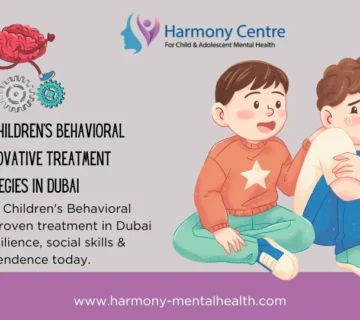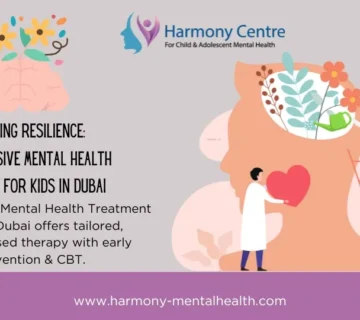Child Depression Counseling Dubai: Compassionate, Evidence‑Based Support at Harmony Centre
Discover child depression counseling in Dubai at Harmony Centre. Our expert, evidence‑based approach helps children overcome depression and build resilience.
Contact Information
| Contact Method | Details |
|---|---|
| Phone | +971 (52) 8773268 / 04 558 2015 |
| Click Here | |
| info@harmony-mentalhealth.com | |
| Address | Office 409, Building Alrazi-64C, 26th St, Healthcare City, Dubai |
Introduction
In a fast‑paced, competitive city like Dubai, children can face significant emotional challenges that may lead to depression. At Harmony Centre Mental Health Dubai, we understand that early, compassionate intervention is essential to help children overcome depressive symptoms and build a foundation for lifelong resilience. Our multidisciplinary team provides tailored child depression counseling using evidence‑based strategies that address both emotional and behavioral aspects of depression. We empower families with the knowledge and support needed to navigate these challenges, ensuring that every child receives the care they deserve.
Learn More About Harmony Centre • Contact Us
Understanding Child Depression
What Is Child Depression?
Child depression is a serious mental health condition that affects a child’s mood, behavior, and overall functioning. Unlike occasional sadness, depression in children is persistent and can interfere with daily activities, including school performance, social interactions, and family relationships.
Key Symptoms of Child Depression
- Emotional Indicators:
Persistent sadness, irritability, or feelings of hopelessness. - Behavioral Changes:
Withdrawal from friends and family, loss of interest in activities, and frequent crying. - Cognitive Symptoms:
Difficulty concentrating, indecisiveness, and negative thoughts. - Physical Manifestations:
Changes in appetite, sleep disturbances, and unexplained aches or fatigue. - Social Impact:
Isolation from peers and reluctance to participate in group activities.
Causes and Contributing Factors
Child depression can be influenced by a variety of factors, including:
- Genetic Predisposition:
A family history of depression or other mood disorders. - Environmental Stressors:
Academic pressures, bullying, family conflicts, or significant life changes. - Biological Factors:
Imbalances in brain chemistry or hormonal changes. - Traumatic Experiences:
Exposure to trauma, neglect, or loss can trigger depressive symptoms. - Chronic Health Issues:
Ongoing physical illnesses can also contribute to emotional distress.
Recognizing the signs and understanding the underlying causes of depression is the first step toward effective intervention.
The Importance of Early Intervention in Child Depression
Why Early Counseling Matters
Early intervention in child depression is critical for several reasons:
- Preventing Worsening Symptoms:
Prompt counseling can stop mild depressive symptoms from developing into severe depression. - Enhancing Coping Skills:
Early therapy teaches children effective ways to manage stress and emotions. - Improving Academic and Social Outcomes:
Addressing depression early can help improve concentration, academic performance, and social interactions. - Supporting Family Dynamics:
Counseling provides families with the tools to understand and support their child’s emotional needs. - Long‑Term Resilience:
Early treatment builds a foundation of resilience that helps children navigate future challenges.
The Role of Parents, Educators, and Clinicians
Effective child depression counseling involves a collaborative approach:
- Parents:
Provide insights into their child’s behavior and work closely with therapists to reinforce coping strategies at home. - Educators:
Observe changes in classroom behavior and collaborate on creating supportive learning environments. - Clinicians:
Use evidence‑based practices to diagnose and treat depression, tailoring interventions to each child’s unique needs.
For more insights on early intervention strategies, visit the World Health Organization (external link).
Our Approach to Child Depression Counseling at Harmony Centre
Comprehensive Assessments
Initial Consultation
Your journey toward recovery begins with an in‑depth initial consultation. During this session:
- Family History and Concerns:
Our specialists gather detailed information about your child’s emotional and behavioral history. - Parental Input:
Parents share observations regarding mood, academic performance, and social interactions. - Preliminary Screening:
A brief assessment identifies key symptoms and sets the stage for further evaluation.
Standardized Testing and Behavioral Observations
We use scientifically‑validated tools and direct observations to assess your child’s depressive symptoms:
- Validated Instruments:
Standardized tests measure cognitive functions, emotional stability, and behavioral patterns. - Direct Observations:
Clinicians observe your child in both clinical settings and natural environments, such as at home or in school. - Collaborative Feedback:
Input from teachers and caregivers is integrated to provide a holistic view of your child’s condition.
Learn More About Our Assessment Process
Multidisciplinary Team Review
After gathering assessment data, our multidisciplinary team, which includes child psychologists, psychiatrists, occupational therapists, and educators, meets to review the findings.
- Team Meetings:
Regular interdisciplinary meetings ensure that all perspectives are considered. - Diagnostic Profile Creation:
We develop a comprehensive profile outlining your child’s strengths, challenges, and specific depressive symptoms. - Goal Setting:
Clear, measurable goals are established to guide the creation of a personalized treatment plan.
This collaborative review ensures that our treatment plan is tailored to your child’s unique needs.
Personalized Treatment Plans
Individual Counseling Sessions
Our child depression counseling is rooted in evidence‑based therapies:
- Cognitive Behavioral Therapy (CBT):
CBT helps children identify and challenge negative thought patterns, replacing them with positive, constructive thinking. - Interpersonal Therapy:
This approach focuses on improving relationships and communication skills, which can alleviate depressive symptoms. - Play Therapy:
For younger children, play therapy provides a non‑threatening way to express emotions and work through challenges.
Family and Group Therapy
- Family Counseling:
Involving the family in therapy fosters a supportive home environment and helps parents learn strategies to support their child. - Group Therapy:
Peer support groups provide a safe space for children to share experiences and learn coping strategies in a supportive setting. - Parental Workshops:
These workshops equip parents with practical tools to reinforce therapeutic techniques at home and enhance the overall treatment process.
Ongoing Monitoring and Telehealth Support
- Regular Follow‑Up:
Scheduled sessions monitor progress and allow for adjustments to the treatment plan. - Telehealth Services:
Virtual consultations provide flexible, continuous support for busy families. - Digital Tools:
Online resources and apps help track mood and progress between sessions.
Evidence-Based Outcomes and Success Stories
Quantitative Improvements
Our evidence‑based approach has demonstrated significant improvements in children with depression:
- Symptom Reduction:
Many patients experience a 30–50% decrease in depressive symptoms after consistent therapy. - Enhanced Academic Performance:
Improved mood and concentration lead to better academic results. - Improved Social Interactions:
Children become more engaged with peers and participate more confidently in social settings.
Qualitative Success
Real-life testimonials highlight the transformative impact of our child depression counseling:
“Since beginning therapy at Harmony Centre, my daughter’s mood has improved dramatically. She is more engaged at school and enjoys interacting with friends.”
– Parent Testimonial
“The personalized approach and continuous support from Harmony Centre have been a game-changer for my son. His confidence has grown, and he now copes better with stress.”
– Parent Testimonial
For further reading on depression treatment strategies, visit the National Institute of Mental Health (external link).
Practical Strategies for Parents and Educators
For Families
Create a Supportive Home Environment
- Consistent Routines:
Establish regular schedules for meals, homework, and relaxation to provide stability. - Open Communication:
Foster an environment where your child feels comfortable discussing their feelings without judgment. - Encourage Physical Activity:
Regular exercise can improve mood and overall well‑being. - Mindfulness Practices:
Engage in family mindfulness sessions, such as guided meditation or yoga, to reduce stress and promote relaxation.
Stay Informed and Involved
- Educate Yourself:
Learn about depression and effective coping strategies through reputable sources. - Participate in Workshops:
Join parental workshops to gain practical tips on supporting your child’s mental health. - Monitor Progress:
Keep a journal of your child’s behavior and mood, and share insights with your therapist.
For Educators
Foster a Positive Classroom Environment
- Implement SEL Programs:
Incorporate Social‑Emotional Learning curricula that teach students about managing emotions and building resilience. - Monitor Student Well‑Being:
Observe changes in behavior and academic performance, and communicate any concerns with parents and mental health professionals. - Provide a Supportive Space:
Create a classroom atmosphere where students feel safe to express their feelings and ask for help.
Collaborate with Mental Health Professionals
- Regular Meetings:
Participate in meetings with school counselors and therapists to discuss strategies for supporting students. - Integrate Feedback:
Use insights from mental health assessments to tailor classroom interventions. - Encourage Peer Support:
Facilitate group activities that promote social interaction and emotional sharing among students.
For the Community
Engage in Public Awareness Initiatives
- Attend Workshops and Seminars:
Participate in community events focused on mental health education to stay informed about best practices. - Join Support Groups:
Connect with other parents and educators to share experiences and effective strategies. - Advocate for Access to Care:
Support public awareness campaigns that promote early intervention and accessible mental health services for children.
Explore Our Community Initiatives • Contact Harmony Centre
Frequently Asked Questions about Child Depression Counseling Dubai
Book a Consultation Now
Contact Information
Office Address:
Office 409, Building Alrazi-64C, 26th St, Umm Hurair 2, Dubai Healthcare City, Dubai
Phone:
+971 4 558 2015
+971 5 287 73268
Email:
info@harmony-mentalhealth.com
Final Thoughts about Child Depression Counseling Dubai
Child depression counseling is a critical step toward helping your child overcome emotional challenges and build a brighter, healthier future. At Harmony Centre Mental Health Dubai, our comprehensive, evidence‑based approach provides personalized, compassionate care that supports early intervention and continuous growth. By working closely with families, educators, and community resources, we empower children to develop effective coping strategies and regain their confidence.
Invest in your child’s well‑being with expert child depression counseling from Harmony Centre. Together, we can create a supportive environment where your child thrives academically, socially, and emotionally.
Learn More About Harmony Centre
Get in Touch
👉 Book a Consultation Now: Call +971 4 558 2015 or visit www.harmony-mentalhealth.com.
Join our online community and stay updated with our latest events, articles about Child Depression Counseling Dubai



